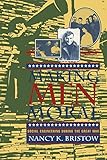Making Men Moral : Social Engineering During the Great War / Nancy K. Bristow.
Material type: TextSeries: The American Social Experience ; 8Publisher: New York, NY : New York University Press, [1996]Copyright date: ©1996Description: 1 online resourceContent type:
TextSeries: The American Social Experience ; 8Publisher: New York, NY : New York University Press, [1996]Copyright date: ©1996Description: 1 online resourceContent type: - 9780814712207
- 9780814725009
- Military bases -- Social aspects -- United States
- Social reformers -- United States -- History -- 20th century
- Soldiers -- United States -- Conduct of life
- World War, 1914-1918 -- Social aspects -- United States
- HISTORY / Social History
- Bristow
- Combining
- Great
- Nancy
- US
- War
- among
- between
- brings
- competing
- complex
- cultural
- cultures
- deep
- divisions
- dozens
- efforts
- evocative
- here
- history
- illustrating
- life
- military
- nations
- photographs
- pivotal
- progressive
- reform
- reformers
- relationship
- revealing
- social
- themselves
- with
- 355.1/33 20
- UH630 .B75 1996eb
- online - DeGruyter
| Item type | Current library | Call number | URL | Status | Notes | Barcode | |
|---|---|---|---|---|---|---|---|
 eBook
eBook
|
Biblioteca "Angelicum" Pont. Univ. S.Tommaso d'Aquino Nuvola online | online - DeGruyter (Browse shelf(Opens below)) | Online access | Not for loan (Accesso limitato) | Accesso per gli utenti autorizzati / Access for authorized users | (dgr)9780814725009 |
Frontmatter -- Contents -- List of Illustrations -- Preface -- Acknowledgments -- CHAPTER ONE. "An Invisible Armor": The Progressive Social Vision and World War One -- CHAPTER TWO. "Full-Orbed Moral Manhood": Cultural Nationalism and the Creation of New Men and Women -- CHAPTER THREE. Reformers between Two Worlds: The Battle against Tradition and Working-Class Modernism -- CHAPTER FOUR. Building a National Community: The Complexities of Gender -- CHAPTER FIVE. Repression and Resistance: African Americans and the Progressives' National Community -- CHAPTER SIX. The End of the Crusade: Demobilization and the Legacy of the CTCA -- Epilogue -- Appendixes -- Notes -- Index
restricted access online access with authorization star
http://purl.org/coar/access_right/c_16ec
On May 29, 1917, Mrs. E. M. Craise, citizen of Denver, Colorado, penned a letter to President Woodrow Wilson, which concluded, We have surrendered to your absolute control our hearts' dearest treasures--our sons. If their precious bodies that have cost us so dear should be torn to shreds by German shot and shells we will try to live on in the hope of meeting them again in the blessed Country of happy reunions. But, Mr. President, if the hell-holes that infest their training camps should trip up their unwary feet and they be returned to us besotted degenerate wrecks of their former selves cursed with that hell-born craving for alcohol, we can have no such hope. Anxious about the United States' pending entry into the Great War, fearful that their sons would be polluted by the scourges of prostitution, venereal disease, illicit sex, and drink that ran rampant in the training camps, countless Americans sent such missives to their government officials. In response to this deluge, President Wilson created the Commission on Training Camp Activities to ensure the purity of the camp environment. Training camps would henceforth mold not only soldiers, but model citizens who, after the war, would return to their communities, spreading white, urban, middle-class values throughout the country. What began as a federal program designed to eliminate sexually transmitted diseases soon mushroomed into a powerful social force intent on replacing America's many cultures with a single, homogenous one. Though committed to the positive methods of education and recreation, the reformers did not hesitate to employ repression when necessary. Those not conforming to the prescribed vision of masculinity often faced exclusion from the reformers' idealized society, or sometimes even imprisonment. Social engineering ruled the day. Combining social, cultural, and military history and illustrating the deep divisions among reformers themselves, Nancy K. Bristow, with the aid of dozens of evocative photographs, here brings to life a pivotal era in the history of the U.S., revealing the complex relationship between the nation's competing cultures, progressive reform efforts, and the Great War.
Mode of access: Internet via World Wide Web.
In English.
Description based on online resource; title from PDF title page (publisher's Web site, viewed 06. Mrz 2024)


